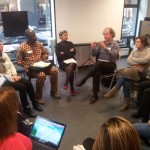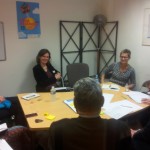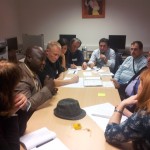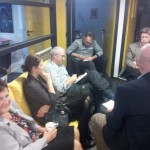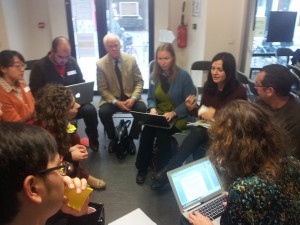 World café summary from NGO Forum Sunday 23rd November
World café summary from NGO Forum Sunday 23rd November
The world café was held as part of the NGO forum day to which there were 95 participants from 38 countries.
The purpose of the World café was to facilitate a discussion for such a large number of participants, normally groups would move between tables, however due to the large numbers and the physical space restrictions it was decided to move facilitators.
The participants split into six groups and five discussions were conducted in English and one in French. There were six facilitators and three questions to be posed to six groups so each facilitator took a questions and went to two different groups.
Facilitators:
Albert van der Zeijden, Joanne Orr, Naila Ceribasic, Severine Cachat, Diego Gradis, Jorijn Neyrinck
The questions posed where related to the theme of the day of how NGOs work with states parties.
1) Barriers and Opportunities to working together
2) Specific added values of NGO activities versus experts in the collaboration of NGOs and states parties on the politics of safeguarding in national contexts
3) Experiences and best practices in cooperation between and NGOs and state parties
The feedback from the groups is captured under these three headings and summarised below.
1) Barriers and opportunities
Opportunities
- UNESCO accreditation is important in relation to states parties – NGOs – Communities and their respective interconnectedness: because UNESCO accreditation gives more respect to the safeguarding work in civil society. It is a good tool for working on capacity building as it highlights that civil society’s efforts are part of a global network. It also brings respect from government when NGOs have accreditation as it strengthens credibility.
- A good understanding between NGOs and States Parties can strengthen the implementation of the Convention decisively
- The ICH NGO Forum can play an important and generic role in coordinating, facilitating and translating the multiple concerns, contributions and activities of NGOs, and can mediate to break down barriers between NGOs, States Parties and UNESCO.
- The experience from practitioners from the field combined with the expertise of experts in NGOs is a real asset when working closely with State Parties bringing fresh perspectives. Although it was noted that is was important to have independant experts without any hidden agendas.
- NGOs bring a broader view which makes for a wider inventory and brings independent thinking to the imlementaiton of the Convention.
- The opportunity around the Convention’s representative list was seen as important in helping to safeguard tradiitons in teh futue.
Opportunities that may also be barriers (depending on context):
- The need for funds to do NGO work > lack of, or reducing funding could be perceived as a barrier, however a dependence on state funding was not seen as a good thing.
- Language: the UNESCO language is good to work with the state because the convention tells us that ICH is dynamic, but at the same time there can be a problem of translating the UNESCO language when working with differenet audiences. NGOs can potentially act as translators that know and understand and use both diverse languages to speak about ICH.
- There are challenges around States Parties building their own knowledge and understanding of ICH and the Convention. This particulalry applies if it has not been translated well.
- It was felt that ICH and the role of NGOs needed to be recognized in the law, and that there was a need for national policies for ICH which integrated NGO functions.
- It can be a barrier to have so many active NGOs in the ICH field, but it is also an opportunity having so many NGOs that can have a voice and raise issues as well as
multiplying and enhancing the implementation of the Convention at all levels local to national.
- Having politicians be champions for ICH was seen as an opportunity however some potential challenges where also identified particulalry where politicians where changing regularly.
Barriers:
- Challenges when policy making was around a cultural majority when the cultural minority maybe ignored and does not the opportunity to input into policy making.
- Risks and challenges where also identified around ‘secret’ heritage where there could not be intervention and it is unclear if safeguarding is happening.
- In a political context a risk of politicians changing traditions to fit political priorities was also identified, or over regularising the cultural practice to the point that it is changed.
- We need more or better criteria in order to have to have a stronger form of accreditation for NGOSs at both a country level as well as a UNESCO level.
- The risk or barrier is when States Parties prefer not to share responsiblilites with NGOs.
- Poverty was also seen as a barrier to engagement when people abandon traditions and NGOs becoming economic migrants and knowledge is lost.
2) Specific added values of NGO activities versus experts in the collaboration of NGOs and states parties on the politics of safeguarding in national contexts
- According to the discussion, it appeared that experts are at least equally if not more represented in ICH NGOs as activists.
- At the same time, the specific emphasis in the understandings of these two categories differ across the world and they should not be taken as opposites.
- The ideal is to merge expertise and activism, and this is often actually the case within many NGOs, either in terms of gathering both activists and experts within an NGO or uniting both sides.
- Possible differentiations along the bottom-up (vs top-down), ingroup-outgroup, and skills-knowledge dichotomies were also discussed.
- As for specific added value of activists, some suggested that since this Convention relies on the centrality of community, the advocacy of this principle — which is the very domain of NGO activists — is thus also of crucial importance.
- Thanks to their professional recognition and reputation, experts are in a better position, to approach and convince States Parties to act accordingly.
3) Experiences and best practices in cooperation between and NGOs and state parties
- The scale and diversity of NGOs is enormous with international NGOs like the International Council for Traditional Music or the European Federation of Traditional Sports to subsidized expert institutions on a national level, e.g. Open Air Museum Bokrijk or national community association’s active in a specific domain, e.g. Norwegian Folk and Craft association.
- Then there are types of NGOs such as National or International federations active in a specific domain. These organizations mainly (or often) work together with local governments. The European traditional sports federation often organizes some sort of international sports event, of course in a specific location. These local governments find this attractive for their city to have such an event in cooperation with this international association.
- All these organizations have different roles and different relationships with governments. Collaborations between NGOs and State parties in safeguarding ICH depends on political systems – central or federal governments – so that there are many different situations: as an example in Spain, accredited NGOs are in contact with autonomous (regional) governments, whereas in Burkina Faso, accredited NGOs are in connection with the Ministry for Culture. Political changes are also an issue, one NGO may develop close and successful collaborations with the State, then there are elections resulting in a changing of majority and the relations become more distant.
- Relationships between governments and NGOS are also influenced by funding models such as financial support in return delivering expert work and knowledge for the government.
- Some of the subsidized NGOs told us that they get official backing and financial support from their governments as a form of recognition of their work. Also some of the community associations, which are mainly voluntary associations, get money from the government: e.g. the Norwegian Folk and Crafts Association to do projects or even money for paid consultancy.
- There is another side to this. As one of the NGOs remarked: if you do your work well, you will get more work but not necessary more support or more funding.
- There is also a question of independence from government. NGOs commented: ‘we try to remain independent but if you work in this way for the government some of the communities might see you as an extension from a (sometimes) bureaucratic government, because governments want to have results which can be measured with forms etc.’.
- Some NGOs mentioned difficulties in articulating local and national levels in the safeguarding of ICH – notably in inventorying ICH, and in raising awareness not only on emblematic national elements but also on local elements.
- Role of NGOs In general: they have expert knowledge of the field and of the communities. They can help the government in developing and implementing specific programs and specific projects.
- ICH is also getting more and more present into academic world (performance studies etc.), which offers new perspectives of collaboration with NGOs.
- Some NGOs raised awareness of the Convention to governments (like did Unescocat with autonomous government of Catalunya). Several NGOs are now collaborating with State Parties (inventories of ICH in Hungary and Burkina Faso, safeguarding plans…) or are being included in working groups and consulted on ICH issues eg legislation on ICH in China and ICH and advancement of women in Saudi Arabia.
- Many NGOs stressed that accreditation gave them credibility with both State and civil society. Legitimacy does not come only from the accreditation (one NGO explained that the State party tried to minimize the importance of their accreditation, in order to control their activities), but from the work effectively done on the field.
(Some pictures of the World Cafè)

